Natural Resources
Learn about City of Naperville programs, services, projects and resources that help preserve and protect our natural resources.
Healthy Yards and Healthy Communities
The actions we take to maintain our yards can have direct consequences for the health of our community and our rivers. These ideas and resources can help achieve a beautiful yard while also caring for the environment.
- Plant a tree. Each year, the City hosts an Arbor Day Tree Sale, in which residents can choose from a number of container-grown species including maples, oaks and elms for use in beautifying their yards and sustaining the environment.
- Replace turf grass with native and deep-rooted plants, which have higher absorption and storage of stormwater, aid in erosion prevention, and increase emission sequestration.
- Collect rainwater in a rain barrel. This conserves water and makes for happy plants while lowering your utility bill. Order your own rain barrel for pickup at The Conservation Foundation's McDonald Farm or home delivery. You can also place an order to pick up your rain barrel during the Arbor Day Tree Sale.
- Use smart technology to water your lawn and garden only when it needs it. Learn how irrigation controllers can help you water more efficiently.
- Consider installing a native planting pollinator garden.

- Learn about what is planted in the City’s pollinator garden located on the east side of the Municipal Center roof at 400 S. Eagle St.
- Earn a certificate for your garden through The Conservation Foundation’s Conservation@Home Program
- Create a Monarch Waystation
- The City encourages residents to plant habitats for monarch butterflies to lay eggs. Habitats that meet criteria established by the Monarch Watch organization can become certified as a Monarch Waystation.
- See tips for creating a Monarch Waystation
A Beautiful Yard Without Pesticides
Studies show that the use of lawn chemicals can have environmental and health ramifications. These chemicals can contaminate surface and groundwater, affect outdoor and indoor air quality, and threaten the health of pets and wildlife. Alternative approaches include:
- Leave grass clippings on the lawn to act as a natural fertilizer.
- Overseed to fill in existing bare spots in the late summer or early fall. This approach will prevent weeds from taking over these spaces in the spring.
- Aerate your soil to facilitate healthy grass growth.
- Keep your mower blade setting at least 2-3 inches tall to allow your grass to develop deeper, more drought-resistant roots.
Native Plants
Native plants are defined as species that have adapted to a specific region over thousands of years. Integrating plants native to Illinois into local landscaping not only adds beautiful character to your property, but also offers a variety of benefits, including:
- Reduced water, pesticide and fertilizer needs.
- Higher sequestration of carbon, in turn reducing air pollution.
- Reduction of water runoff and erosion.
- Stewardship of Naperville's natural resources and organisms by providing nectar, pollen and seeds that serve native species and pollinators as food sources.
- Promotion of local ecological restoration.
Conservation@Home Program
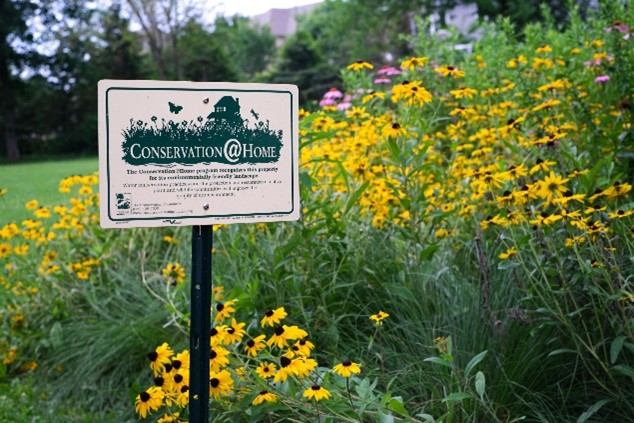
Have you considered using native plants in your landscaping?
The Conservation Foundation’s Conservation@Home program offers free advice and ideas to help eliminate chemical use, incorporate earth-friendly landscaping and create native gardens.
Great news for Naperville residents: after the great success of our 2024 partnership, the City will again cover the cost of on-site consultations and certification fees for 2025! This is a fantastic opportunity to create a more resilient ecosystem right in your backyard.
Here's how it works: an expert from The Conservation Foundation will visit your property and offer personalized advice on plants, maintenance practices, and design elements that boost biodiversity. If you meet the criteria, your property will earn a certification, and you'll receive a sign to showcase your eco-friendly status—perfect for raising awareness in your neighborhood.
Join the many homeowners who have incorporated native plants into their landscapes to create beautiful outdoor spaces, invite birds and butterflies to their yards, and reduce their use of water, fertilizers and pesticides. Get started with Conservation@Home today!
Native Vegetation Management Program
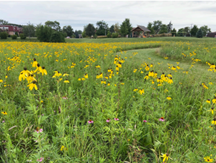
To improve water quality and develop sustainable green infrastructure, the City established and will measure the impacts of the Native Vegetation Management Program through 2028. Initial work began on five sites in 2023 with the help of a consultant, including Lake Osborne (1.4 acres), Old Plank Park (9.9 acres), Country Commons (7.4 acres), Public Works (1.5 acres), Auto Test Track (2.0 acres), and Washington Street Signage (0.8 acres).
Work on these sites include invasive species removal, weed control, controlled burning, native plant installation, and continued maintenance. Thirteen new sites are being evaluated for future inclusion in Naperville’s native vegetation management to further advance sustainability efforts.
Healthy Waterways
The DuPage River, which houses Naperville’s beloved Riverwalk, along with other local lakes and waterways are essential to our environment’s health and beauty. Consider the following to protect the water ways along with their beauty, ecosystems, and organisms.
- In 2025, we are celebrating the 34th annual DuPage River Sweep, a waterway cleanup held each spring. Contribute to Naperville’s environmental health and beauty by removing debris from our waterways, improving water and shoreline quality for wildlife and recreation. The Sweep will take place on Saturday, April 19th from 9 a.m. to 12 p.m., with registration open until April 5th with The Conservation Foundation!
- Salt Smart during the winter season. Beyond excess salt damaging vehicles and harming pets and plants, too much salt also degrades our waterways. Learn more about best practices when salting with the Salt Smart Collaborative!
- Dispose of hazardous materials correctly. Do not flush or pour medicine, auto fluids, paint, lawn care products, harsh chemicals, and similar substances. These contaminants are difficult for our wastewater treatment plant to process and can end up in local waterways. Utilize Naperville’s Household Hazardous Waste!
- Recreate responsibly and leave no trace. When engaging in recreational activities in natural spaces and near waterways, be mindful of how you impact ecosystems. Be sure to leave no trace—leave the area how you found it (or better)!
No Mow 'til Mother's Day
By waiting to pull out their lawnmowers and refraining from the use of pesticides and herbicides, residents allow early flowering plants to grow, providing a critical food source for newly emerged pollinators and supporting the development of healthy urban ecosystems.
Registered participants will be exempt from ordinances governing "weeds" and grass height until the Saturday following Mother’s Day with the display of a printable No Mow ‘til Mother’s participation sign, similar to a building permit.
REGISTER TO PARTICIPATE IN NO MOW 'TIL MOTHER'S DAY
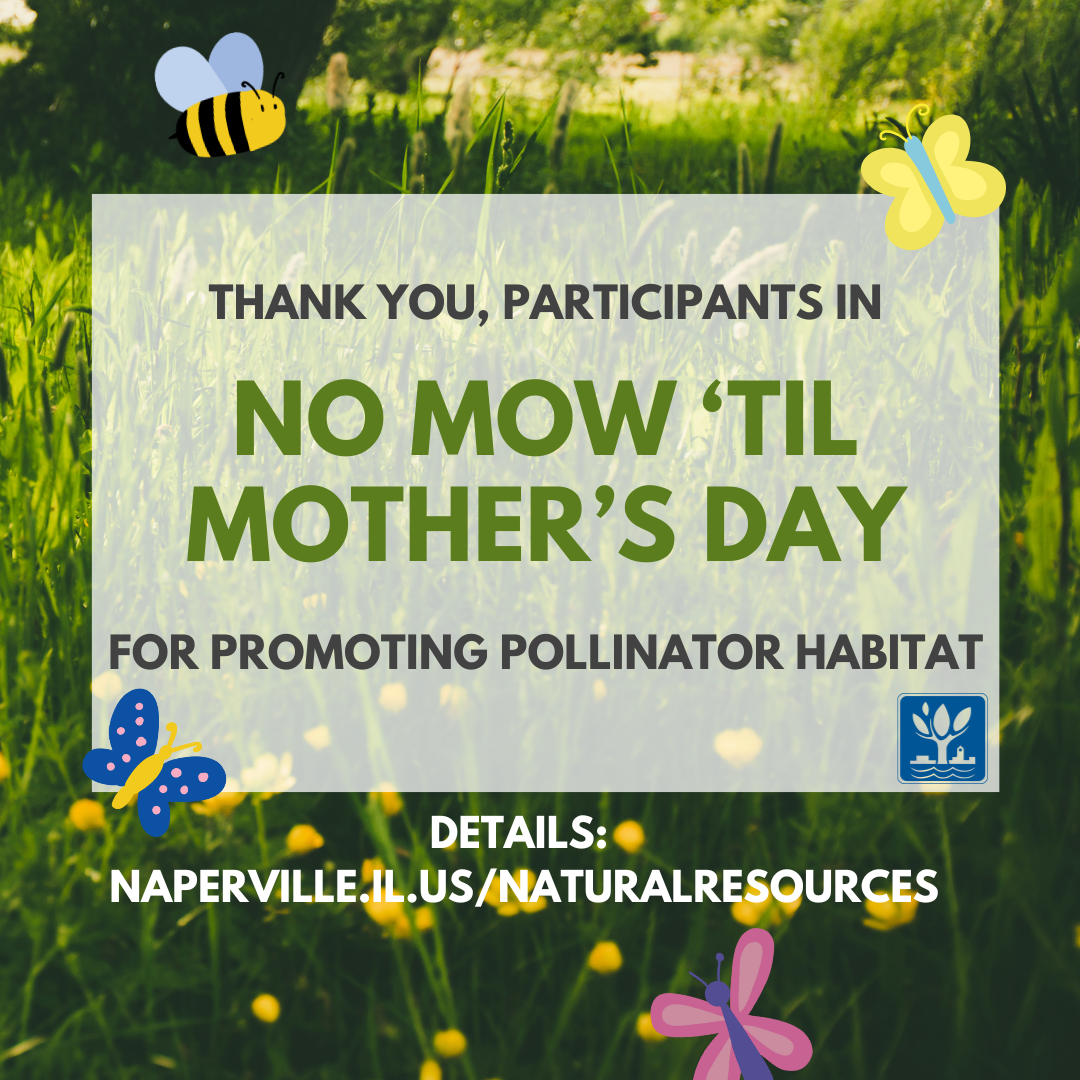
Compost and Yard Waste Services
- Learn about the Combined Yard Waste/Organics program, which allows residents to recycle food scraps and regular yard waste together in one container for pickup by refuse contractor Groot Industries. Food scraps and yard waste currently make up about 20 to 30% of the waste stream, but composting these materials keeps them out of landfills, where they take up space and release methane, a potent greenhouse gas.
- Learn how to start making compost at home with this article from The Conservation Foundation.
- Find details about the City’s Yard Waste collection program
- Find details about the City’s Bulk Brush Collection program, offered every spring
- Find details about the City’s Bulk Curbside Leaf Collection program and free bagged leaf collection, both of which take place every fall
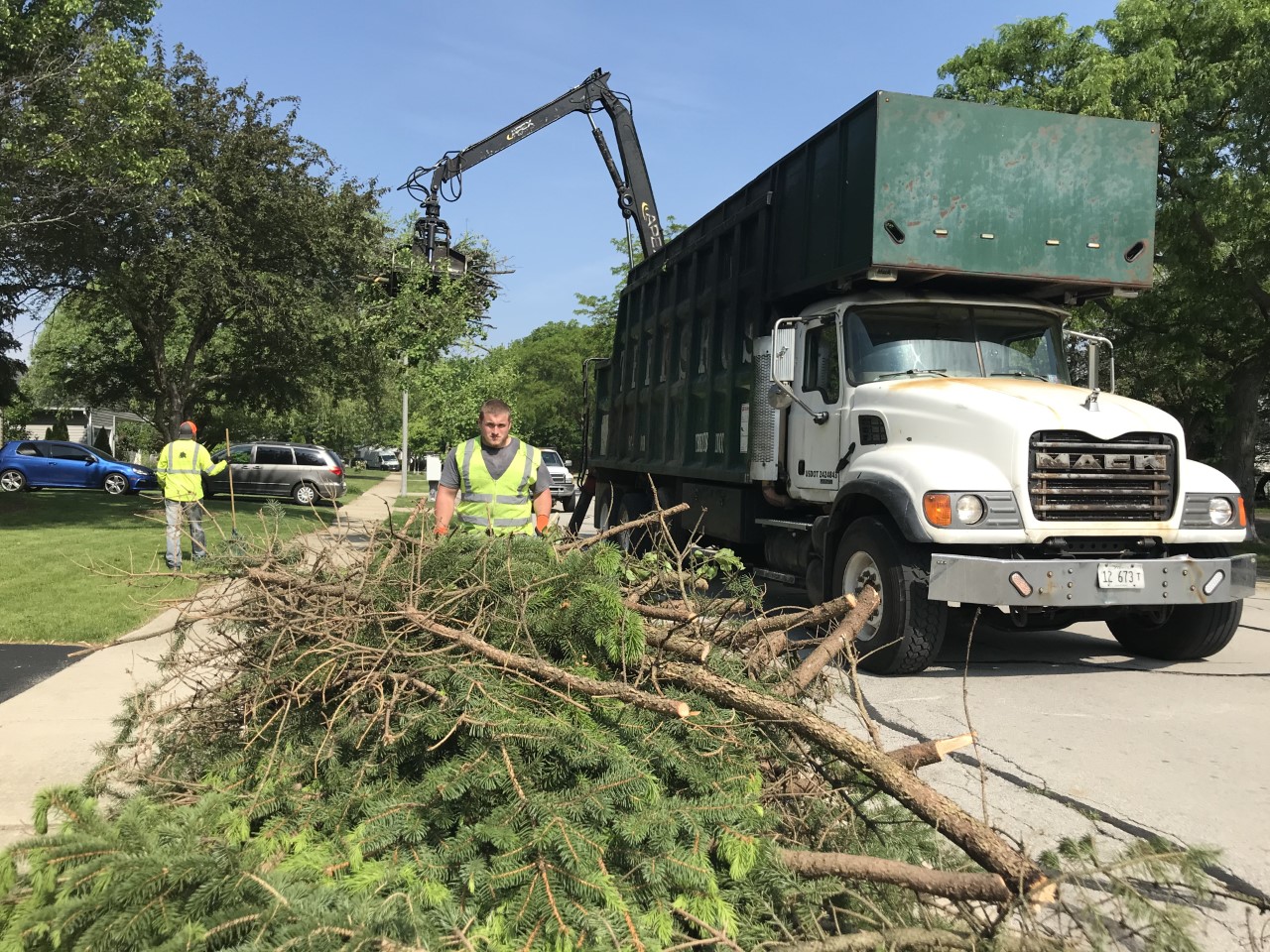
Electric Lawn Equipment Rebate
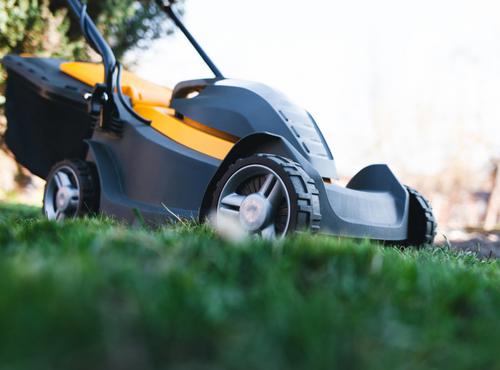
This popular program, introduced in 2022, provides a $50 rebate to residents who purchase a battery-powered electric lawn mower, snow blower, leaf blower, trimmer, edger or manually powered reel lawn mower. Participants are eligible for one rebate per household per calendar year, and rebates are available on a first-come, first-served basis.
Naperville’s electric lawn equipment rebate will reopen on April 1st, 2025, offering $50 rebates to eligible residents who purchase a battery-powered electric lawn mower, snow blower, leaf blower, trimmer, edger or manually powered reel lawn mower.
